U.S. Department of Transportation
Federal Highway Administration
1200 New Jersey Avenue, SE
Washington, DC 20590
202-366-4000
Office of Technical Services
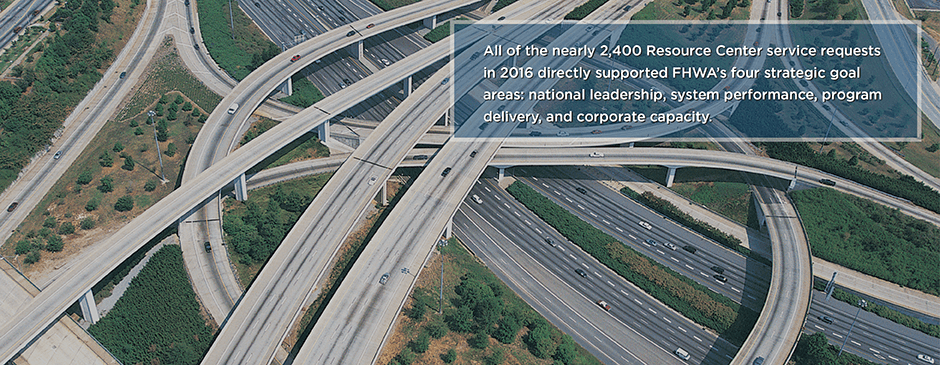
As the largest unit in OTS, the Resource Center (RC) continues to make its mark across the agency by providing just-in-time training and technical assistance. As a leader in technology deployment, the RC facilitates transportation decision making, delivering innovative solutions to the highway community. The RC actively promotes new products and technologies by participating in demonstrations, peer exchanges and showcases across the Nation.
The RC staff can be found at the heart of every major FHWA technical initiative, and the agency relies on RC expertise to meet tough transportation challenges as they arise. The RC is on call – serving myriad customers – from FHWA division offices to State departments of transportation (DOT), metropolitan planning organizations (MPO) and other agencies. In 2016, the RC’s technical experts staffed 12 Technical Service Teams (TST) designed around the following key disciplines or functional areas in highway transportation:
Air Quality |
Hydraulics |
The TSTs work collaboratively with each other and across all FHWA units to deliver seamless service and achieve meaningful results.
In 2016, RC team members responded to nearly 2,400 service requests across the country. Thirty seven percent of requests were for technical assistance, followed by 29 percent for training and 18 percent for technology deployment. The remaining 16 percent were requests for discipline support, process reviews and project management.
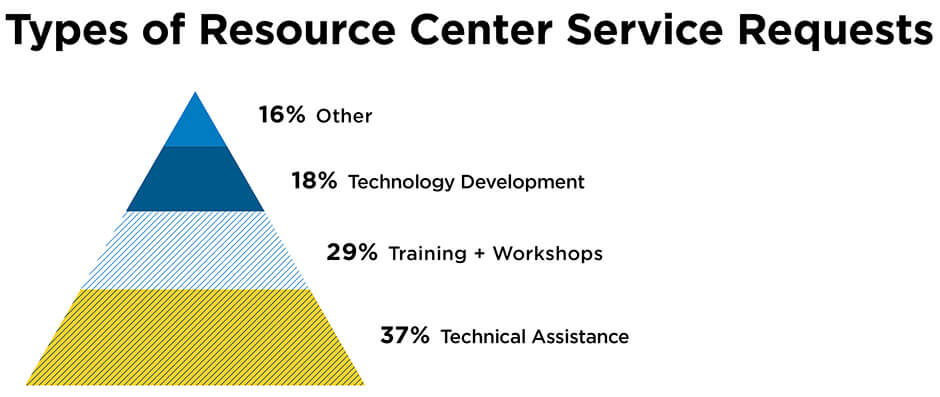
Because of the large number of requests the RC handles each year, the unit uses a system called the Service Request Reporting System. This enhanced system allows the RC to plan and track requests, collaborate across teams and with customers, identify employee development opportunities, and tie services directly to the agency’s Strategic Implementation Plan.
The RC staff is known to be responsive, collaborative and expert in their fields, able to tailor their assistance to unique client needs and situations. Team members use a variety of delivery methods, including face-to-face technical support, onsite courses, Webinars, teleconferences, summits, conventions and forums to connect, partner and problem solve. RC staff provides service to all 52 FHWA division offices, each Federal Lands division office, and multiple State and local transportation agencies. While the RC is well versed in virtual collaboration and training techniques, staff also understands the importance of personal contact, balancing live training and assistance with effective resource management.
Customized training is an important component of the RC’s services. The RC team offers just-in-time training in the form of customized courses, specialized Webinars, and instructional videos to meet the immediate needs of the highway community. A significant portion of this is virtual training, allowing the RC to reach a geographically diverse audience and save transportation agencies money. In 2016 the RC trained more than 51,000 customers – 28,000 in person and 23,000 via virtual training. The RC frequently partners with NHI to teach formal courses in face-to-face or virtual formats.

Beyond responding to requests from its transportation clients, the RC actively promotes and supports major FHWA agency initiatives and programs. The RC currently provides ongoing and significant value to two major innovation deployment programs – EDC and the SHRP2. In 2016, the RC supported more than 280 service requests in support of the EDC program, and nearly 150 in support of SHRP2 implementation. This support was instrumental to the success of both of these FHWA priority programs.
The RC teams also contribute to the professional development of its members and FHWA staff through the FHWA’s DSS – an integrated system designed to strengthen technical skills across the agency. The DSS is an integrated system designed to strengthen technical skills across the agency. The RC teams support the DSS seminars as trainers, discipline workshop leaders and instructors to ensure seminar attendees keep their skills current and proficient. From preparing modules for the Virtual Construction Workshop to developing and delivering sessions for Finance Services seminars to leading the Structures Webinar series, each TST is actively engaged in leading its respective discipline.
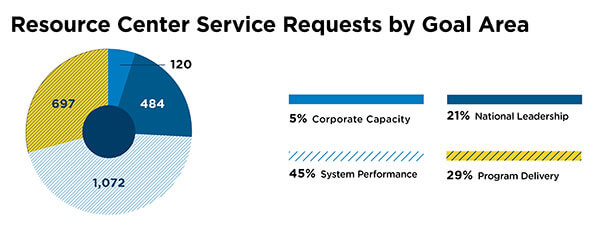
All of the nearly 2,400 RC service requests in 2016 directly supported FHWA’s four strategic goal areas: national leadership, system performance, program delivery, and corporate capacity. These numbers do not include services of less than 4 hours in duration, nor do they include the significant time spent assisting customers on an ad hoc basis via telephone and email. Services provided by the 12 teams included technical assistance, technology deployment, process review, project management, and discipline support.

The Air Quality team undertook a variety of activities that demonstrated partnership, collaboration, and outreach. In 2016, the team partnered with the Transportation Research Board (TRB) and the American Association of State Highway and Transportation Officials (AASHTO) to produce a Webinar related to the EPA revised ozone standard, conducted a workshop for Arizona transportation agencies on the development of transportation plans to address greenhouse gas emissions, and helped FHWA headquarters develop guidance and training materials to address the Council on Environmental Quality Greenhouse Gas Guidance in the National Environmental Policy Act (NEPA) process. The team played a lead role, facilitating both the Northern Transportation and Air Quality Summit and the Southern Transportation and Air Quality Summit. These summits brought industry professionals together to collaborate and discuss the most critical air quality issues.

The Civil Rights team was a lead sponsor of four Disadvantaged Business Enterprise (DBE) Academies in 2016. The DBE Academies were a partnership effort with the Departmental Office of Civil Rights, FHWA Office of Civil Rights, Federal Aviation Administration, Federal Transit Administration and DOT Office of Inspector General. This ONE DOT initiative delivered national training and technical assistance to DOT recipients to help them understand current regulations, and to implement the new requirements in a consistent manner nationwide. Approximately 500 participants from highway, airport and transit agencies attended the DBE Academies. Their evaluations indicated that the knowledge gained will aid them in administering an effective DBE program. The goal is to enhance participation of DBEs in DOT-assistance contracts.

The Construction and Project Management team (CPM) made critical contributions to numerous FHWA priority efforts, including EDC and SHRP2. The team also served as key contributors to numerous NHI courses, workshops and peer exchanges, and expanded its widely successful FAE library of videos. The CPM team led the development of the library, which features easily digestible video segments to explain sometimes complex Federal-aid policies and procedures. The team has continued to serve in a lead role since the project’s inception. In 2016, seven new Federal-aid Essentials video modules were added to the already robust library. CPM team members also led efforts in 3D Engineered Models, E-Construction and Contracts Administration Core Curriculum Training. The CPM team led the delivery of numerous workshops touching hundreds of stakeholders across the country.

The Environment and Realty team provides expertise in applying Federal environmental and realty requirements in the project development process. In 2016, the team received the FHWA Administrator’s Award for Excellence in Teamwork for its exceptional work leading the National Range-wide Endangered Species Act Programmatic Consultation for the Indiana bat and Northern long-eared bat, in partnership with the U.S. Fish and Wildlife Service. The Programmatic Consultation is projected to save State DOTs more than $5 million per year. The Environment and Realty team also moderated the Ohio Tribal Summit with the FHWA Ohio division office, the Ohio DOT and nine federally recognized tribes. The summit focused on tribal consultation protocols and improvements to the current tribal consultation process in light of Ohio’s recent NEPA Assignment.

The Finance team provides expertise in a variety of topics including Federal-aid highway financing, financial reporting and analysis, management and internal controls, grants management, program reviews, indirect cost allocation plans, financial policy coordination, audits and internal controls, and more. Taking advantage of new training methods, the Finance team revised and updated curriculum for the Financial Management Boot Camp. The Boot Camp was then relaunched as a virtual training course. The course uses a combination of live and online instructional techniques. The Finance team provided leadership and instructors to hold the first Financial Management Discipline Seminar since 2011. The seminars focused on the Financial Integrity Review and Evaluation program. The seminars were held in three locations over three different weeks.

The Geotechnical Engineering team provides assistance in a number of specialty areas including geotechnical seismic engineering, instrumentation, asset management, risk management, performance management, ground improvement, geology and more. In 2016, the team contributed to construction projects across the country, including the Tappan Zee Bridge (New York), the Sarah Mildred Long Bridge (New Hampshire/Maine), the Alaskan Way Viaduct Replacement Project (Washington), and the Parallel Thimble Shoal Tunnel Project (Virginia). In addition, the team’s training skills and subject matter expertise helped move the SHRP2 and EDC initiatives forward. The team instructed the SHRP2 course, GeoTechTools (R02), in six States: Colorado, Florida, Louisiana, Massachusetts, Utah, and Washington. The team also delivered EDC’s Geosynthetic Reinforced Soil-Integrated Bridge System training at multiple events, showcases, and peer exchanges. More than 500 individuals attended the EDC courses.

In the past year, the Hydraulics team planned, organized, and delivered the 2016 National Hydraulic Engineering Conference, working in partnership with colleagues at Oregon DOT, AASHTO, and TRB. The full team participated in the conference, presenting three technical papers: 1) Hydraulic Modeling: Selecting the Right Tool for the Right Job; 2) Green Infrastructure for Coastal Highway Resilience; and 3) FHWA’s In-Situ Scour Testing Device. The team also led a workshop on the Sedimentation and River Hydraulics – Two-Dimensional model (SRH-2D). This is a hydraulic sediment, temperature and vegetation model for river systems developed and maintained by the Bureau of Reclamation. The FHWA sponsors the development of procedures within the SRH-2D to model transportation infrastructure, including bridges and culverts. Thirty State DOTs were represented, with a total of 200 attendees.
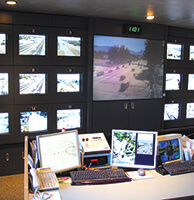
In 2016, the Operations team provided extensive technical assistance to the SHRP2 and EDC initiatives. The team supported the SHRP2 Reliability focus area, conducting workshops in several States on Organizing for Reliability. These workshops raised awareness and understanding of the benefits of a Transportation System Management and Operations Program. The team helped agencies conduct capability self-assessments and facilitated open discussions that led to improving programs. The Operations team also assisted in conducting workshops for SHRP2’s National Traffic Incident Management Responder Training Program (L12/L32A/L32B), working with the National Firefighter Academy. These efforts supported SHRP2’s goal to train 1 million responders. Through the Arterial Management Program, the team continues to deploy the EDC technology, Adaptive Signal Control.

One of the most significant achievements for the Pavement and Materials team was the successful partnership with the Asphalt Institute in the development of the Tack Coat Workshop and associated follow-up coordination in 25 States. The outcome of this partnership and workshop has led States to make major changes to standard practices, encouraging a national focus on improving the durability of asphalt pavements. Tack coats are a vital component of an asphalt pavement’s structural system as they bond the multiple asphalt lifts into one monolithic layer. Poor tack coat application results in poor bonding of the asphalt layers, which often can lead to classic structural pavement distresses – namely fatigue cracking and potholes. The four-hour workshop presents practices and methodologies to assist State DOTs in the construction of better built and longer-lasting pavements.

In 2016, RC staff led the agency’s work in developing Freight Profile Factsheets for the Administrator’s Freight Economy Roundtables. The team also helped identify and recruit private, State and local participation in the roundtables. The Planning staff led the involvement of 19 Federal agencies assisting Macon, Georgia as part of the White House Council on Strong Cities, Strong Communities initiative. This initiative supports cities experiencing population and job loss, persistent poverty, capacity constraints and similar challenges in an era of ever-dwindling resources. As a pilot, Macon was selected to receive intensive technical assistance from Federal and inter-agency teams, working with city officials to support the community’s vision for economic revitalization. The Planning and Freight team supports priorities such as: multimodal transportation, economic development, downtown revitalization, blight elimination, poverty reduction, and public safety.

The Safety and Design team provided substantial support leading and deploying EDC innovations in the safety arena. Road Diets are an EDC-3 initiative and an FHWA Proven Safety Countermeasure that reduces crashes by an average of 29 percent. The RC has played a key role in the partnership to advance deployments of Road Diets. The classic Road Diet converts an existing four-lane undivided roadway to a three-lane segment consisting of two through lanes and a center two-way left turn lane. The reduction of lanes allows the roadway cross section to be reallocated for other uses such as bike lanes, pedestrian refuge islands, transit stops, or parking. In 2016, more than 20 training workshops were conducted. The team also is carrying out EDC-3 initiatives supporting Data-Driven Safety Analysis, including training, technical assistance and other activities. These activities will be continued in the EDC-4 deployment efforts. Efforts also have continued to advance the deployment of the EDC-2 initiative, Intersection and Interchange Geometrics, by improving the 1-day training course on this subject and continuing the training as a course offering through NHI. In addition, an informational video production is being developed for the EDC-2 initiative, High Friction Surface Treatment.
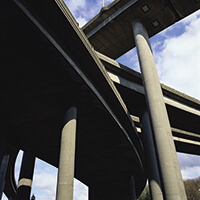
In 2016, the Structures team led the deployment efforts of nine SHRP2 products – six structures-related products and three utility-related products. This resulted in 39 deployment projects. In addition, the Structures team is managing deployment of the EDC initiative, Ultra-High Performance Concrete Connections for Prefabricated Bridge Elements (UHPC PBE), garnering support from leadership for the implementation plan and budget. The use of prefabricated bridge elements has led to the recognition that durable connections are an important part of any successful bridge construction project. This EDC-3 effort focuses on the advantages offered by UHPC as an option for the connection of prefabricated bridge elements.